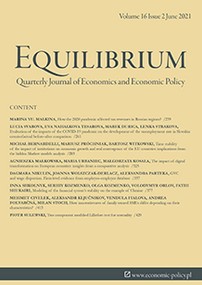Oil price and the economic activity in GCC countries: evidence from quantile regression
Oil price and the economic activity in GCC countries: evidence from quantile regression
Author(s): Mourad Zmami, Ousama Ben-SalhaSubject(s): Supranational / Global Economy, Business Economy / Management, Energy and Environmental Studies, Economic history, International relations/trade, Economic development, Post-War period (1950 - 1989), Transformation Period (1990 - 2010), Present Times (2010 - today), Financial Markets
Published by: Instytut Badań Gospodarczych
Keywords: oil price; economic growth; cointegration; quantile regression; asymmetry; GCC;
Summary/Abstract: Research background: The effects of oil price fluctuations on the macroeconomic performance in oil-importing and oil-exporting countries have stimulated considerable research activity. However, the debate is far from being closed. Purpose of the article: This paper revisits the impact of crude oil price on economic activity in the Gulf Cooperation Council oil-exporting countries. The study covers a relatively long period spanning from 1960 to 2018. Methods: The empirical investigation accounts for structural breaks, nonlinearity, and nonnormal distribution of data. The Kapetanios (2005) structural breaks unit root test and Saikkonen–Lütkepohl (2000a, b, c) cointegration test with structural shifts are implemented to examine the stationary properties of data and the presence of cointegration between variables, respectively. Moreover, the quantile regression is employed to assess whether the impact of oil price on real GDP differs across different states of the economy. Findings & Value added: Empirical results suggest the absence of long-run cointegrating relationships between oil price and GDP in all countries. The quantile regression reveals that oil price does not affect real GDP in the same way across countries and for different business cycle phases. More specifically, the symmetric quantile regression findings reveal that oil price exerts a positive impact on GDP in all countries and that the effect is higher during the recession than expansion states. The asymmetric quantile regression shows that GDP reacts to positive oil price changes in all countries. However, only the Emirati and Omani GDPs are affected by negative oil price changes.
Journal: Equilibrium. Quarterly Journal of Economics and Economic Policy
- Issue Year: 15/2020
- Issue No: 4
- Page Range: 651-673
- Page Count: 23
- Language: English

